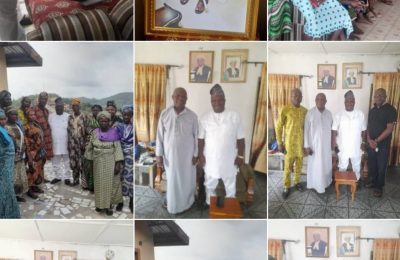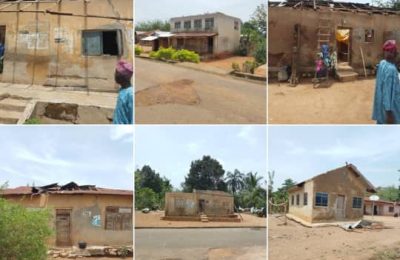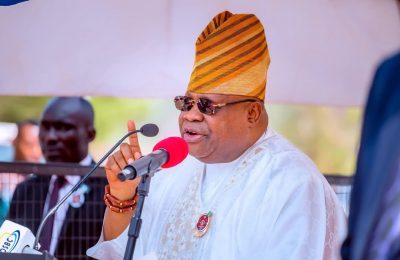
Oluwatomisin Adeyefa is a journalist and founder of Purple Abilities Initiative. In this interview with IFEDAYO OGUNYEMI, she spoke about her experience as a 2024 fellow of the Mandela-Washington Fellowship in Leadership and Civic Engagement and her plans to use the media to advance the rights of women and girls with disabilities.
WHAT motivated you to apply for the Mandela Washington Fellowship, and how does this opportunity align with your personal and professional goals?

My motivation for the MWF stemmed from the passion to grow and widen my horizon. As a journalist with a disability in this 21st century, you need all the tools and network to grow and develop in your professional and personal endeavours. Getting into the fellowship is one borne out of persistence and commitment. I applied five times before I got it and so I knew what I wanted and kept at it. Each year my application was rejected, I saw it as an opportunity to be better, improve and do more for my community.
As you already know, it is a highly competitive fellowship across Africa. You’ve got to display passion, leadership skills as well as developmental skills before you are even considered for the semi-final stage. So, I make bold to say I deserved it at the time I got on board. The fellowship has in no small measure opened my wealth of knowledge and experience.
Having the opportunity to be with 24 other fellows from across 21 African countries at the University of Maryland Baltimore county (UMBC) for six weeks as we learned from experts, from ourselves in shared learning, sights visits, cultural exchange, networking events, personal mentorship and so on I can’t even begin to mention that the fellowship has given me the right perspective to development while opening doors of opportunities and partnerships both locally and internationally.
The MWF is just the right propeller I needed to think of myself and what I do, especially in a society where no one gives anyone a chance let alone people with disabilities like me. Discrimination, social exclusion and stigmatisation have killed the dreams of many of us. I had dreams and aspirations myself but no one has allowed me here, so it was a different experience to be in an environment where your disability was accommodated and secondary to your abilities. I know now that I don’t have to go through it all by myself but can thrive on the philosophy of Ubuntu. This fellowship has also brought credibility to my abilities, people no longer see me as a blind helpless girl who probably needs peanuts to survive but now they marvel at my achievements. It is just as if they knew I was there doing my best, but it took the US government to amplify my potential and capabilities.
Can you describe the key areas or projects you planned to focus on during the fellowship and how do these align with your career aspirations?
My focus project for the fellowship is centered around inclusive storytelling: amplifying the voices of women and girls with disabilities against sexual and gender-based violence and social injustice.
These have always been my core in my profession as a journalist. However, the difference right now would be the vigorous and intentional methods of going about my advocacy campaign.
I am currently working on a web series that would address the plights and rights of women and girls with disabilities in Nigeria. Apart from the web series spurring action from every stakeholder, the project would also provide a platform to support and empower women and girls with disabilities in personal development, economic empowerment as well as sexual and reproductive health education.
How are you leveraging the skills and knowledge gained from the fellowship to advance your career and impact your community?
One major lesson from the fellowship is the power of togetherness. Bringing everyone together from diverse backgrounds shows that we all need each other to grow; it’s on this important pillar that I would be leveraging more.
MWF has laid the resources that we all need to thrive. All I need to do is to find the one that aligns with my professional goals and tap into it. Also knowing that I have a supportive vast alumni group makes it all easier, particularly those with whom we share a common goal of impacting our community.
In addition, before the fellowship, I spent precious time going after my weaknesses, forgetting that there is more to explore in my strength, as it becomes valuable not only for me but for others around me, another skill that would be invaluable in the work that I do.
How do you anticipate the Mandela Washington Fellowship will enhance your ability to advocate for and support individuals living with disabilities?
The fellowship has reinstated my confidence in the belief for inclusion and has shown me that it is very possible and easier too to achieve an inclusive society. This will continue to be my motivation as I persist in my advocacy and support initiatives for my community of persons with disabilities.
How has the fellowship experience influenced your perspective on leadership and its role in driving social change for young people, particularly those with disabilities?
I have always believed in servant leadership, so the MWF has enhanced that belief in me. I know as young people, whether you are with a disability or not, the moment we place the people first before our selfish ambitions, no one would suffer abuse, exclusion and injustice.
The fellowship showed me practical examples of servient and sustainable leadership along with structures that hold the leader accountable to the community. It brought to light the intentionality of a people to be inclusive, progressive and people-oriented. You don’t have to have a disability to make provisions for disability. It’s all about forward-thinking about the people you are called to serve.
Can you share any strategies or projects you are considering to engage and inspire other young people, especially those with disabilities?
Your success as leader cannot be measured or felt if you do not breed others behind you and this I intend to do more of especially with my whole new perspectives, knowledge and experience. I earlier mentioned the support initiatives for women and girls in personal development
This would undoubtedly come with mentorship programmes. Ever since my acceptance into the fellowship, I have had young people approach me for mentorship and I have not refused anyone. This is one of the ways we can redirect our future and reshape our world towards positivity and productivity.
What specific challenges do people with disabilities face in accessing and engaging with radio media, and how do you intend to address these challenges?
I wouldn’t want to say radio but media in its totality. The media, because of its effectiveness, has been used to propagate a lot of misconceptions about disability. We are often referred to as helpless, vulnerable, sick, aggressive, and a whole host of other derogatory and demeaning characters. Even while reporting, the reporter is on eggshells around a person with a disability. Sometimes the language is borne out of sympathy and not empathy. And when we finally want to embrace hypocrisy, we say “leave no one behind” while in actual sense, we don’t preach what we practice.
I have seen movies where persons with disabilities would appear lifeless but all of a sudden a miracle happens, the disability vanishes and wow this person not only looks exquisite but also full of life. I have heard journalists say disability matters do not fetch money as much as politics and entertainment. I have seen media houses relegate their only one person with disability who struggles to secure an employment with them being forced to do only disability-related stories or programmes.
There is a national act on the prohibition of discrimination against persons with disabilities, how many media are investigating how far we have gone as a nation. Even when you as a group plan discussions around this, you hardly find the media attend such programmes.
For me, these challenges aren’t insurmountable but efforts have to be deliberate and that is why in my web series project, it is going to be by, of and for persons with disabilities. It’s going to torchlight new and brighter perspectives of disabilities. Intentional accommodations would be made to ensure no one is really left behind.
How can radio stations be more proactive in creating accessible programming and content for individuals with disabilities?
Like I said, efforts towards accessibility have to be deliberate and conscious.
Whatever strategy we choose to use in our media house has to be holistic and clear. Our media personnel also have to be constantly equipped with the process of inclusive reporting and investigations. We must churn out content that doesn’t demean but exemplifies disability and diversity.
READ ALSO: LG chairmen, councilors to enjoy four-year tenure — Supreme Court







